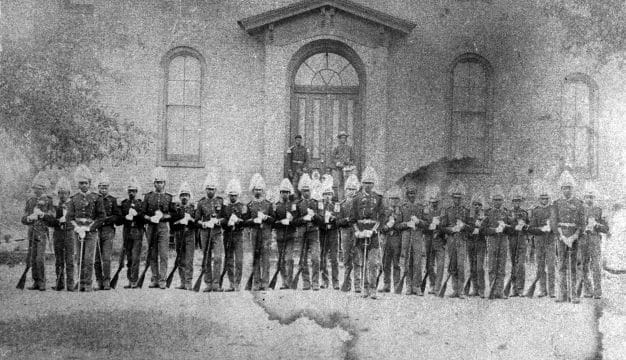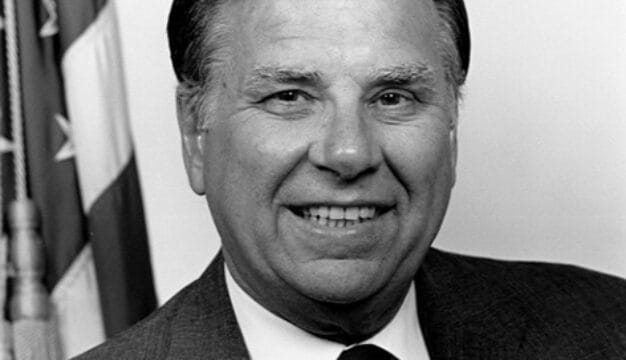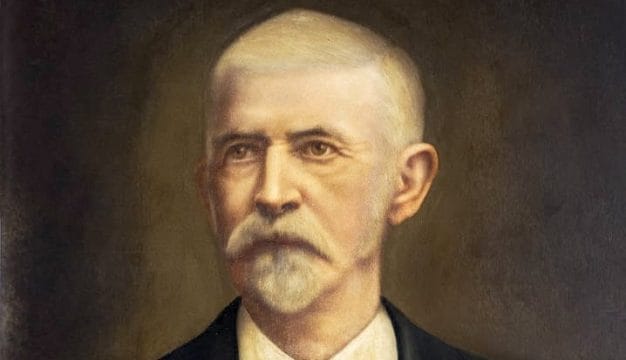Charles Tait
Charles Tait (1768-1835), Alabama’s first federal district court judge, played a significant role in the state’s history as a lawyer, educator, legislator, jurist, scientist, and plantation owner. Prior to his appointment to the federal bench in Alabama, he served as one of Georgia’s U.S. senators from 1809 to 1819. A member of the powerful Broad River political faction in Georgia with close ties to the administration of Pres. James Monroe, Tait used his considerable influence in shepherding through Congress the bill that provided for Alabama’s admission into the Union in December 1819.
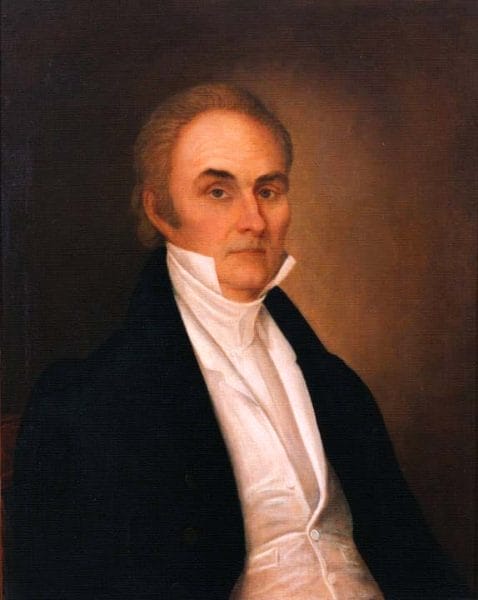 Charles Tait
Born on February 1, 1768, in Louisa County, Virginia, Tait was the oldest of 10 children of James Tait and Rebecca Hudson Tait. When the family moved to Georgia in 1783, young Charles remained behind for several years to finish school in Virginia. Tait’s father aligned with a group of fellow Virginians made up primarily of veterans of the Revolutionary War who moved to Georgia in response to an offer of homesteads on state-owned lands. They settled in the Broad River region in northeastern Georgia near Petersburg and thus have become known to scholars as the Broad River Group. There, they established tobacco farms, married into the local planter families, and acquired financial and political power within their close-knit community.
Charles Tait
Born on February 1, 1768, in Louisa County, Virginia, Tait was the oldest of 10 children of James Tait and Rebecca Hudson Tait. When the family moved to Georgia in 1783, young Charles remained behind for several years to finish school in Virginia. Tait’s father aligned with a group of fellow Virginians made up primarily of veterans of the Revolutionary War who moved to Georgia in response to an offer of homesteads on state-owned lands. They settled in the Broad River region in northeastern Georgia near Petersburg and thus have become known to scholars as the Broad River Group. There, they established tobacco farms, married into the local planter families, and acquired financial and political power within their close-knit community.
As a young man in Georgia, Tait was thrown from his horse while transporting tobacco to market and sustained a serious injury to his leg, resulting in its amputation; he would wear a wooden peg leg for the rest of his life. In 1786, at the age of 18, he entered the inaugural class of the Wilkes Academy in Washington, Georgia, and pursued a classical course of study for two years. In May 1788, Tait entered Cokesbury College in Abingdon, Maryland, America’s first Methodist college. Within four months, he was appointed to the faculty as a French professor and was put in charge of the college’s charity students. He remained at Cokesbury until 1794, while reading law at the same time. On January 3, 1790, Tait married Anne Lucas Simson, a widow from Baltimore, with whom he had two sons, James Asbury in 1791 and Charles Jefferson in 1794, who died at the age of one month.
Tait was admitted to the Georgia bar upon his return home in February 1795, but he continued his interest in education by taking a position as director and professor at the Richmond Academy in Augusta, Georgia, in 1795. The following year, William H. Crawford was appointed as head of the academy’s English department, and he and Tait formed a friendship that would last throughout their lives and would prove valuable for Tait later in his life.
Financial difficulties forced Tait to resign his position at the Richmond Academy and seek political office. In 1799, he won election as a state senator from Elbert County. After serving one term, Tait established a law practice, working with Crawford as his partner until he was elected in November 1803 as a judge in the superior court of Georgia’s Western Judicial Circuit. After his election, Tait came under attack from political opponents who were aligned with a faction in Georgia made up of settlers from North Carolina who had a long-standing feud with the Broad River Group. In 1807, Tait was cornered in the streets of Milledgeville, Georgia, and brutally whipped with a riding crop by the leader of the opposing faction, who believed that Tait and Crawford had conspired to tarnish his reputation.
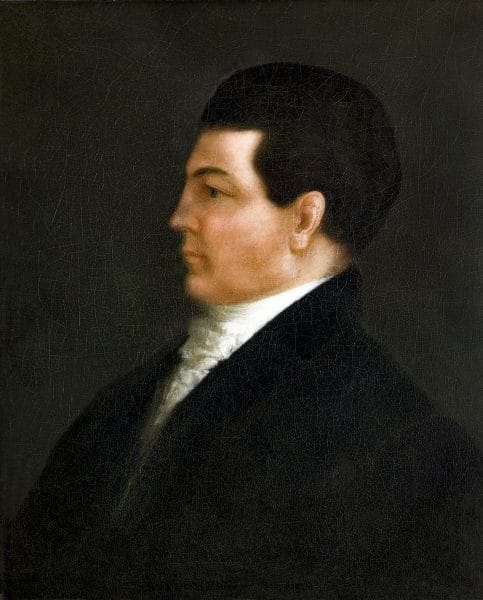 William Wyatt Bibb, 1819
Despite the feud, Tait won a special election to the U.S. Senate when Georgia senator John Milledge resigned in 1809. Tait served out Milledge’s term and then won re-election in 1813, serving in the Senate until March 4, 1819. In 1812, Tait’s Petersburg neighbor and future Alabama governor William Wyatt Bibb, joined him in the Senate. While in the Senate, Tait served as chair of the Committee on Naval Affairs, where in 1816 he sponsored and secured passage of a bill providing an annual naval appropriation of $1 million for a period of eight years, a vast sum of money for the time. Tait also formed a friendship with Pres. James Monroe’s secretary of war, John C. Calhoun, during this period, and the men corresponded for many years. Tait was also a regular correspondent with his cousin, renowned political figure Henry Clay.
William Wyatt Bibb, 1819
Despite the feud, Tait won a special election to the U.S. Senate when Georgia senator John Milledge resigned in 1809. Tait served out Milledge’s term and then won re-election in 1813, serving in the Senate until March 4, 1819. In 1812, Tait’s Petersburg neighbor and future Alabama governor William Wyatt Bibb, joined him in the Senate. While in the Senate, Tait served as chair of the Committee on Naval Affairs, where in 1816 he sponsored and secured passage of a bill providing an annual naval appropriation of $1 million for a period of eight years, a vast sum of money for the time. Tait also formed a friendship with Pres. James Monroe’s secretary of war, John C. Calhoun, during this period, and the men corresponded for many years. Tait was also a regular correspondent with his cousin, renowned political figure Henry Clay.
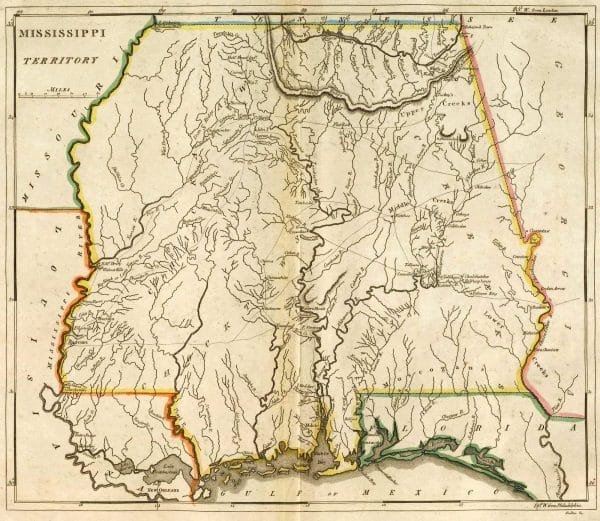 Mississippi Territory
In addition to his expansion of funds for the U.S. Navy, Tait also sponsored Alabama’s admission into the Union. His interest in Alabama resulted from his friendship with John W. Walker and other members of the Broad River Group who had relocated to Huntsville in 1810. Under the influence of his Georgia brethren, Tait led the fight in the Senate to create a separate Alabama Territory from the eastern half of the Mississippi Territory. Tait initially obtained consent from the Georgia state government, which had ceded the territorial lands to the United States, to remove its stipulation that the area remain a single territory. But his efforts were derailed in the spring of 1816, when Bibb and numerous other legislators were forced to resign or were voted out of office after passing an act that effectively doubled the pay of all congressmen. Tait, who had also voted for the increase, initially thought to join the newly appointed territorial governor Bibb in Alabama to escape the storm of protest. But he was persuaded by John W. Walker, Speaker of the House of Representatives in the Alabama Territorial Legislature, to remain and guide through Congress a bill admitting Alabama to the Union. Tait responded by authoring the Alabama Enabling Act, chairing the committee to which it was referred, and working closely with Secretary Crawford to secure its passage. After Alabama was admitted in 1819, Tait moved to the state that he had helped create and settled on lands recently acquired by his son, James Tait, approximately 30 miles from Claiborne on the Alabama River in Monroe and Wilcox Counties.
Mississippi Territory
In addition to his expansion of funds for the U.S. Navy, Tait also sponsored Alabama’s admission into the Union. His interest in Alabama resulted from his friendship with John W. Walker and other members of the Broad River Group who had relocated to Huntsville in 1810. Under the influence of his Georgia brethren, Tait led the fight in the Senate to create a separate Alabama Territory from the eastern half of the Mississippi Territory. Tait initially obtained consent from the Georgia state government, which had ceded the territorial lands to the United States, to remove its stipulation that the area remain a single territory. But his efforts were derailed in the spring of 1816, when Bibb and numerous other legislators were forced to resign or were voted out of office after passing an act that effectively doubled the pay of all congressmen. Tait, who had also voted for the increase, initially thought to join the newly appointed territorial governor Bibb in Alabama to escape the storm of protest. But he was persuaded by John W. Walker, Speaker of the House of Representatives in the Alabama Territorial Legislature, to remain and guide through Congress a bill admitting Alabama to the Union. Tait responded by authoring the Alabama Enabling Act, chairing the committee to which it was referred, and working closely with Secretary Crawford to secure its passage. After Alabama was admitted in 1819, Tait moved to the state that he had helped create and settled on lands recently acquired by his son, James Tait, approximately 30 miles from Claiborne on the Alabama River in Monroe and Wilcox Counties.
Soon after his arrival, Tait sought William Crawford’s support to return to Washington as one of Alabama’s senators, but economic and political infighting and factionalism led Crawford to back a candidate from the northern part of the state. Instead, Tait was appointed as Alabama’s first and only federal district judge and was confirmed by the Senate on May 13, 1820. Although he generally operated from his court offices in Mobile, Tait occasionally held sessions of court in Huntsville and Cahawba, then the state capital. In 1822, Tait remarried, his first wife having died in 1818. Ironically, his second wife, Sarah Griffin, was the widow of his competitor for the Georgia judgeship in 1803 and sister-in-law of the man who had horsewhipped him in Milledgeville, Georgia, in 1807.
Tait’s most significant case during his tenure on the federal bench involved three ships that were smuggling enslaved people into the United States in direct violation of federal law. In his decision, Tait declared all three vessels and their human captives as forfeited to the United States, overturning an earlier decision by Alabama’s territorial court, which had allowed the captives to be turned over to the persons to whom they were being shipped. The case proceeded up to the United States Supreme Court, which upheld Tait’s main points. In addition to setting a precedent for the prosecution of human traffickers Tait also urged his grand juries to vigorously pursue cases of piracy and other cases of smuggling.
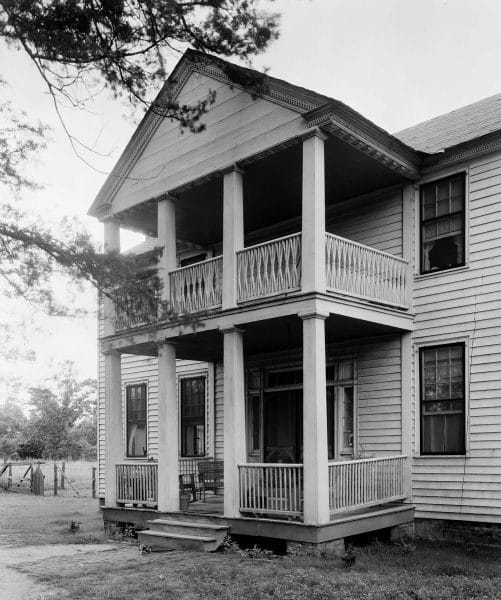 Dry Fork Plantation, 1939
In 1826, Tait resigned his federal judgeship to devote more attention to running his plantation and to pursue scientific interests. He and his wife set out on an extended tour of the United States that took them up the Mississippi and Ohio rivers to Pittsburgh, then via the Erie Canal and the Hudson River to New York City and New England. The couple later settled for seven months in Philadelphia where Tait attended scientific lectures and mingled with the city’s leading scientists. On April 20, 1827, Tait was honored with election to the prestigious American Philosophical Society, which had been founded by Benjamin Franklin in 1743.
Dry Fork Plantation, 1939
In 1826, Tait resigned his federal judgeship to devote more attention to running his plantation and to pursue scientific interests. He and his wife set out on an extended tour of the United States that took them up the Mississippi and Ohio rivers to Pittsburgh, then via the Erie Canal and the Hudson River to New York City and New England. The couple later settled for seven months in Philadelphia where Tait attended scientific lectures and mingled with the city’s leading scientists. On April 20, 1827, Tait was honored with election to the prestigious American Philosophical Society, which had been founded by Benjamin Franklin in 1743.
The Taits returned home to Claiborne in the fall of 1827 and began to study the vast deposits of fossils on his property along the bluffs of the Alabama River. Referred to as the “Claiborne beds,” these deposits contained the largest number of fossil Eocene shells known at the time, and Tait’s investigation of them earned him election as a corresponding member of the Academy of Natural Science of Philadelphia in July 1832. Tait spent the rest of his time managing his property, which included more than 4,000 acres and held 115 enslaved people; he even turned down an appointment by Pres. John Quincy Adams to serve as the U.S. ambassador to Great Britain.
The last few years of Tait’s life were spent on his son’s estate, Dry Fork, near Camden in Wilcox County, where he died on October 7, 1835, at the age of 67. He is buried in Dry Forks Cemetery.
Further Reading
- Freyer, Tony, and Timothy Dixon. Democracy and Judicial Independence: A History of the Federal Courts of Alabama, 1820-1994. Brooklyn, N.Y.: Carlson Publishing, 1995.
- Moffat, Charles H. “Charles Tait: Planter, Politician, and Scientist of the Old South.” Journal of Southern History 14 (May 1948): 206-33.
- Tompkins, Alma C. Charles Tait. Auburn, Ala.: Alabama Polytechnic Institute Historical Studies, 1910.
